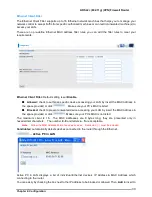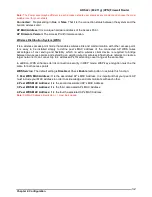
ADSL2+ (802.11g) (VPN) Firewall Router
Chapter 4: Configuration
26
Profile Port:
Select the connection mode. There isADSL.
Encapsulation
: Select the encapsulation mode. The default mode is PPPoE.
VPI/VCI
: Enter the VPI and VCI information provided by your ISP.
Username
:
Enter the username provided by your ISP.
Password
: Enter the password provided by your ISP.
Service Name
: This item is for identification purposes. If it is required, your ISP provides you the
information.
Authentication Protocol
: Default is
Auto.
Your ISP advises on using
Chap
or
Pap.
IP Address:
Your WAN IP address. Leave this at 0.0.0.0 to obtain automatically an IP address
from your ISP.
6. Configure the Wireless LAN setting.
WLAN Service:
Default setting is set to
Enable
.
If you want to use wireless, both 802.11g and
802.11b device in your network, you can select
Enable
.
ESSID:
The ESSID is the unique name of a wireless access point (AP) to be distinguished from
another. For security propose, change to
a unique ID name to the AP which is already built-in to
the router’s wireless interface. It is case sensitive and must not excess 32 characters. Make sure
your wireless clients have exactly the ESSID as the device, in order to get connected to your
network.
ESSID Broadcast
:
It is function in which transmits its ESSID to the air so that when wireless
client searches for a network, router can then be discovered and recognized. Default setting is
Enable.
Enable:
When Enable is selected, you can allow anybody with a wireless client to be
able to locate the Access Point (AP) of your router.
Disable:
Select Disable
if you do not want broadcast your ESSID. When select Disable,
no one will be able to locate the Access Point (AP) of your router.
Channel ID:
Select the ID channel that you would like to use.
Security Mode:
You can disable or enable with WPA or WEP for protecting wireless network.
The default mode of wireless security is
Disable
.
















































